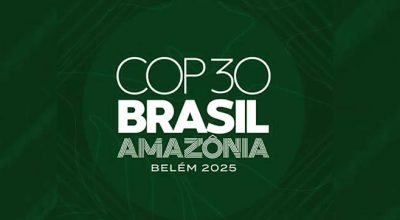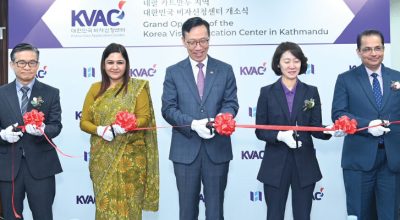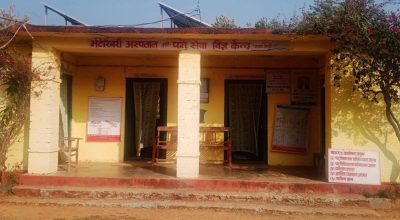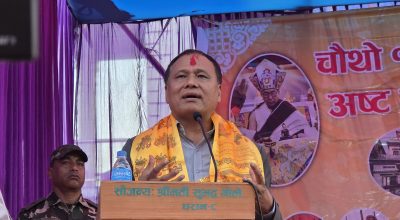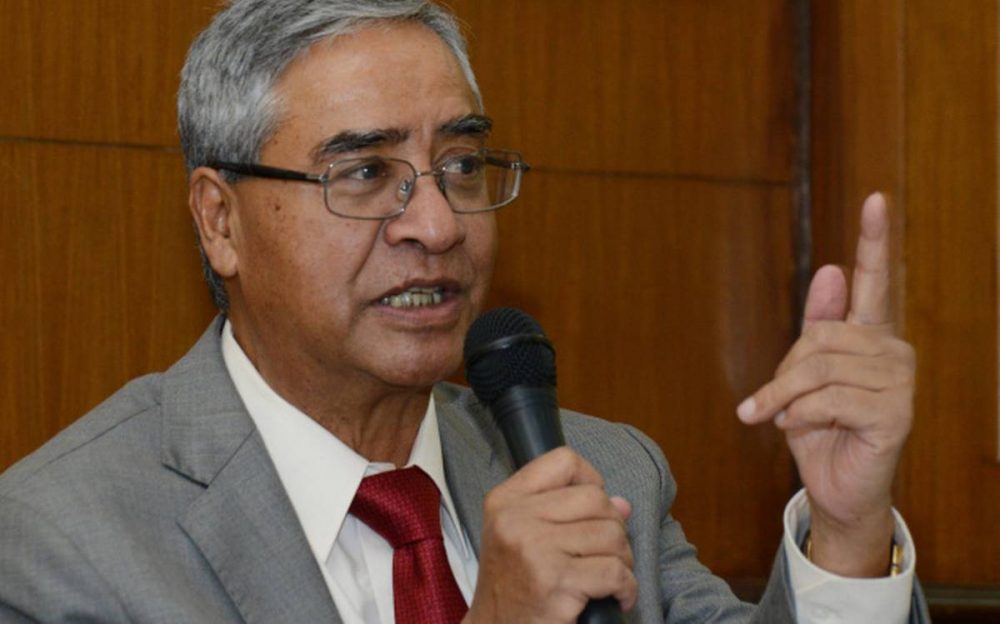
Gotabaya Rajapaksa, President of the Democratic Socialist Republic of Sri Lanka, Sheikh Hasina, Prime Minister of the People’s Republic of Bangladesh, Lotay Tshering, Prime Minister of the Kingdom of Bhutan, Narendra Modi, Prime Minister of the Republic of India, Prayut Chan-o-cha, Prime Minister of the Kingdom of Thailand, Ministers, Secretary General of BIMSTEC
Namaskar and warm greetings from Nepal!
I would like to express my sincere appreciation to Your Excellency Mr. Gotabaya Rajapaksa and the Government of Sri Lanka for the successful stewardship of BIMSTEC process over the last three and a half years. Holding of this Summit would not have been possible without your pro-active leadership, commitment, and dedication.
I would also like to commend Secretary-General Mr. Tenzin Lekphell and his team for their tireless professional service to the Organization.
Thanks are also due to the Honourable Ministers and our Senior Officials for their diligent work in the lead-up to this Summit.
Excellencies,
The world today faces challenges that are both complex and unprecedented in their nature, gravity, and urgency.
These challenges are further aggravated by emerging threats, primarily climate change, digital divide, and crises such as the COVID-19 pandemic.
Like any other part of the world, our region has been fighting an epic battle against the pandemic over the last two years. Hundreds of thousands of people have died, many have relapsed into poverty, and structural vulnerabilities have deepened.
Even if the pandemic curve seems to be flattening gradually, the fight is far from over. Its economic and developmental consequences are sure to play out for quite some time.
Vaccine inequity has become yet another impediment to resilient recovery.
In this context, our Summit today carries a higher significance. It is a true testament to the resilience of our regional spirit, a pledge of unity and solidarity, and a crucial step forward for our cooperation and collaboration.
It is a commitment to the shared goals of peace, progress and prosperity as enshrined in the 1997 Bangkok Declaration.
The Fourth Summit held in Kathmandu was a significant marker of the renewed urgency recommitting to build a robust BIMSTEC. It mandated the negotiation of the Charter, recommended the rationalization and re-structuring of sectors and sub-sectors, and called for strengthening the Secretariat.
We are pleased that, today, we are going to sign the Charter and adopt some important instruments.
This will certainly be a key milestone in the history of our Organization.
But this is not sufficient. An organization of 1.6 billion people and a combined GDP of over 3 trillion US dollars must set higher ambitions.
We must muster the requisite political will to ensure that BIMSTEC process rekindles hope and reignites imagination.
We must breathe new life into the Organization by pooling our strengths and resources.
We must better frame the future of cooperation to translate our ambition into action for our peoples, our countries, and our region.
This will require concrete action on several fronts.
First, our race to resilience must start with a green and inclusive recovery plan.
This means action on vaccines, investment in health systems, and expansion of social protection schemes.
BIMSTEC must do its part to ensure that the region builds back better and is well-prepared for any future shocks.
It needs to chart out sustainable pathways to deal with the long-term economic, social, and developmental consequences of COVID-19.
Second, with less than a decade left, our region is not on track to achieve any of the Sustainable Development Goals by 2030.
So, we must accelerate the implementation of these global ambitions.
We must ensure an early operationalization of BIMSTEC Development Fund. This will be critical to uplift people’s lives and livelihoods, create economic opportunities, and scale up growth.
It is more crucial for countries like Nepal, which are set to graduate from the LDC category. This is also because preparations for graduation will overlap with the pandemic recovery.
Third, connectivity plays a catalytic role for enhancing an effective regional process.
BIMSTEC cannot thrive in the absence of deeper integration of our countries, societies and markets through roads, railways, airways, and waterways. This calls for investment in transportation networks, energy, and power grid interconnections.
The BIMSTEC Master Plan for Transport Connectivity we are going to endorse today is a crucial step forward.
Fourth, enhanced trade and investment linkages are a sine qua non for a robust regional cooperation.
However, the volume of intra-regional trade and investment within BIMSTEC is not that encouraging. The pandemic has further dampened the trade and investment flows.
We need to reverse this.
The success of our Organization will be contingent upon the innovation it inspires, the entrepreneurship it ignites, and the economic partnership it promotes.
An early conclusion of the ongoing negotiations on agreements on trade in goods, trade in services, investment, and mutual assistance in customs matters is a must for us to move ahead.
Fifth, our region is at the sharp end of climate change.
Climate crisis has upset the ‘organic link’ between mountains and oceans.
We need bold climate action before the crisis passes the point of no return.
We must build climate-resilient development pathways in line with the global ambition of net zero scenario by 2050.
We must make the current crisis a gateway to a greener, safer, and more sustainable Bay of Bengal region.
Finally, our aspiration of a vibrant, forward-looking, and integrated BIMSTEC region will not be realized without the ownership of peoples and communities at the grassroots level.
Nepal welcomes the move to operationalize tourism circuits connecting our temples, archaeological sites, and eco-tourism and adventure sites.
We must promote Buddhism as a strong connecting thread. In this regard, we call for an early operationalization of the Buddhist circuit connecting Lumbini, the birthplace of Gautam Buddha.
Nepal is pleased to lead the people-to-people contact sector. We remain committed to engaging with other member states and contributing towards building strong bonds at the level of the peoples.
To conclude, regional cooperation is the only route to a more resilient, prosperous and sustainable Bay of Bengal region. In order to realize this regional aspiration, we must enhance visibility of BIMSTEC and promote stronger partnership with international organizations. This is both timely and pertinent as we observe the 25th anniversary of our Organization this year. Nepal remains committed, as ever, to contribute constructively to the BIMSTEC process.
I thank you all for your attention.
National Statement by Prime Minister of Nepal Sher Bahadur Deuba at the Fifth BIMSTEC Summit Colombo, Sri Lanka, 30 March 2022
Theme: BIMSTEC – Towards a Resilient Region, Prosperous Economies, Healthy Peoples










